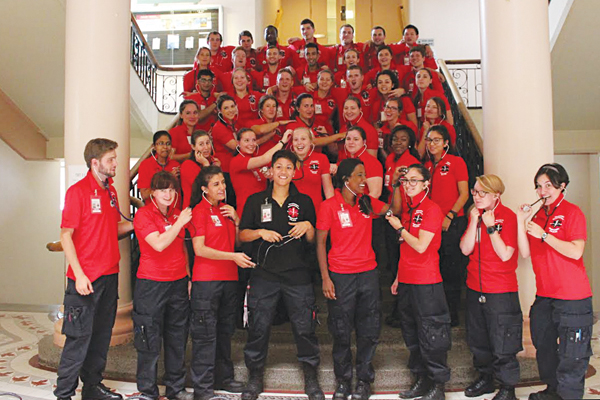New funding comes after students highlighted gaps in the CERB
Prime Minister Justin Trudeau announced $9 billion in financial support for post-secondary students and recent graduates on Wednesday after thousands across the country said gaps in existing COVID-19 emergency measures meant they were slipping through the cracks.
The proposed Canada Emergency Student Benefit (CESB), available from May through August, would provide $1,250 a month to students, increased to $1,750 a month for students caring for others or with disabilities.
College and university students, those who graduated in December 2019, and students starting classes this September would be eligible for the CESB. Payments would be made through the Canada Revenue Agency.
“The month of May usually marks the start of a summer job, but right now, it might be really tough to find something,” Trudeau said at his daily press conference outside Rideau Cottage in Ottawa. “COVID-19 has meant there aren’t as many jobs out there for students, and without a job, it can be hard to pay for tuition or the day-to-day basics.”
Students who are working but make less than $1,000 a month can also access the CESB. Trudeau said he’ll be working with opposition parties to move forward with legislation to put the benefit in place.
Trudeau unveiled the Canada Emergency Response Benefit (CERB) last month, which provides $500 a week for up to four months, but to be eligible applicants must have stopped working due to the COVID-19 pandemic and have made at least $5,000 in the past year.
That means many students and recent graduates who weren’t already working but were looking toward internships and jobs over the summer, which may have been cancelled due to COVID-19, are not eligible to apply. A national survey conducted by the Undergraduates of Canadian Research-Intensive Universities found 83 per cent of the over 3,000 student respondents did not qualify for the CERB.
A coalition of students across the country began pointing to shortfalls in the CERB shortly after it was announced. One petition led by the Don’t Forget Students campaign was backed by over 44,000 signatures as of publication time.
Among the other measures announced, Trudeau said existing support for Indigenous post-secondary students will be boosted by $75 million, while $291 million will go toward extending scholarships or grants for researchers and graduate students by three or four months.
Meanwhile, the prime minister said the government would create 76,000 jobs, in addition to the Canada Summer Jobs Program, for young people in sectors that “need a little extra hand right now.”
The federal government introduced temporary changes to the summer jobs program earlier this month, subsidizing up to 100 per cent of the provincial or territorial minimum hourly wage for each employee, up from the previous limit of 50 per cent, to help employ up to 70,000 more young people.
Reacting to the expansion of the program two weeks ago, Don’t Forget Students founding member Alex Gold-Apel said that while job creation is good, the government “shouldn’t be asking students to put themselves and their families at risk to receive the help that they need.” Gold-Apel also reinforced calls for the expansion of the CERB, what he called “the simplest and easiest way to get assistance out the door.”
Another measure will double grants for eligible students, increasing support to $6,000 for full-time students and $3,600 for part-time students
Additionally, the prime minister said those volunteering on the frontlines of the COVID-19 pandemic can access the new Canada Student Service Grant for payments of between $1,000 and $5,000. A press release said “students who choose to do national service and serve their communities” are eligible.
Tim Gulliver, the University of Ottawa Students’ Union’s incoming advocacy commissioner and an organizer with Don’t Forget Students, called Wednesday’s announcement a “victory” for students and student organizations, but said there’s still progress to be made.
Gulliver said he’s frustrated with “how long it took (for student-centred support to be announced) and how hard students had to fight for the very basic financial help they should be getting through this crisis.”
“Obviously the benefit isn’t going to reduce the fact that there is income inequality, including among students,” said Gulliver. The benefit will help some, “but won’t meet the needs of a lot of students who … have expenses that go beyond what the government expects.”
Gulliver questioned why a two-tiered system was developed between the CERB and the CESB, rather than just expanding the CERB to include more students.
“I don’t think it was necessary to go down this route, I think the CERB should have just been universal in the first place,” said Gulliver. “It would have solved a lot of problems and there are still people who will fall through the cracks who won’t be getting as much help as they need.”
The Canadian Alliance of Student Associations (CASA) and Quebec Student Union are welcoming the announcement.
“This kind of comprehensive aid package is key to ensuring that all Canadian students and recent graduates are protected during this pandemic, ready to return to classes and the workplace once physical distancing measures are reduced,” CASA chair Adam Brown said in a press release on Wednesday.
“Today’s announcement includes much-needed immediate financial relief for students and recent graduates who do not qualify for the CERB, while also making sure that students are able to access and afford their education moving forward.”
Read More:
- Students push for inclusion in Canada’s COVID-19 emergency benefit
- COVID-19: PM expands Canada Summer Jobs Program to employ more students
- COVID-19 prompts changes to services, fees for spring/summer term





